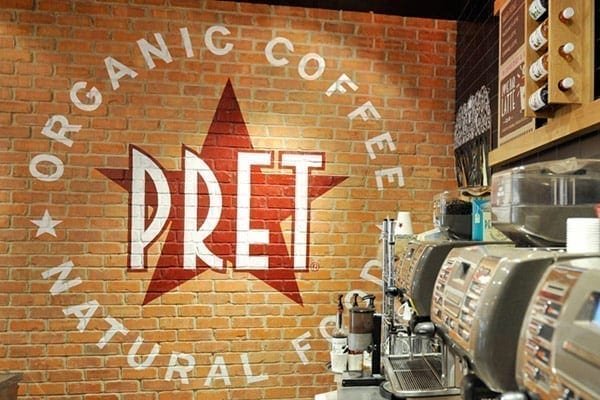Too large to list
In the May 2015 email, Pret admitted that ‘the number of included ingredients is so large, that to provide comprehensive ingredient advice in this way would be impossible.’
Even assuming that this, and the protest that ‘we don’t label our sandwiches due to the volumes we make’, is true, clearly there is plenty of space available at point of sale, but the chain chooses instead to display ‘labels that describe the flavours in each sandwich.’
’Loaf-tanning salons’
Another pillar of Pret’s marketing is ‘freshness’. This includes highlighting that some of its ‘shops have a wonderful baker’s oven (indeed, some have two). We bake our baguettes throughout the day, the fresher the better.’
However, not one of the company’s outlets uses its ‘big, fancy baker’s oven’ to make ‘baguettes, pastries, croissants and savouries in house every day’ from scratch.
While insisting that ‘we don’t sell ‘factory’ stuff’, Pret in fact use its ovens merely as what the Campaign calls ‘loaf-tanning salons’ to bake off mass-produced items pre-made elsewhere at some point in the past.
In October 2016, Schlee wrote that the company had declined to switch to using a Real Bread bakery as ‘their prices were two to three times our current price and moving would cost Pret several million pounds’.
He claimed that they were ‘making progress in moving to cleaner bread’ but it was not clear whether additives would be removed or replaced by so-called ‘clean label’ (i.e. undeclared) processing aids.
As of December 2016, Pret’s ‘natural’ and ‘fresh’ marketing messages were still in use.
‘Come clean’
Since its launch in November 2008, a key element of the Real Bread Campaign’s mission has been to bring about change that gives more people the chance to choose additive-free loaves.
A mainstay of this is calling for changes in governmental policy (an ‘Honest Crust Act’) and commercial practice, which will result in more honest and transparent labelling and marketing to help people to make better-informed loaf and sandwich buying choices.
‘We urge Pret a Manger to come clean, first by displaying lists of all ingredients, including additives, on packaging or at point of sale and bringing its marketing messages in line with its practices. No artificial additive is necessary to make bread and ultimately we would like to see Pret, and all other sandwich sellers, removing all artificial additives.’
CHRIS YOUNG
Real Bread Campaign coordinator
The number ingredients technically necessary to make bread are two: flour and water, from which flatbread can be made. If left to ferment it will produce sourdough.
In practice, salt is added almost universally and, in the UK, loaves are currently more commonly leavened with commercial yeast rather than sourdough starter culture.
Click here to view a list of ingredients and artificial addtives in Pret loaves, baguettes and wraps.
 Play Video about This Rock Might Just Save The World
Play Video about This Rock Might Just Save The World Play Video about Play 2 hours of rock
Play Video about Play 2 hours of rock Play Video about Play 2 hours of brook
Play Video about Play 2 hours of brook Play Video about Play 2 hours of sheep
Play Video about Play 2 hours of sheep











































